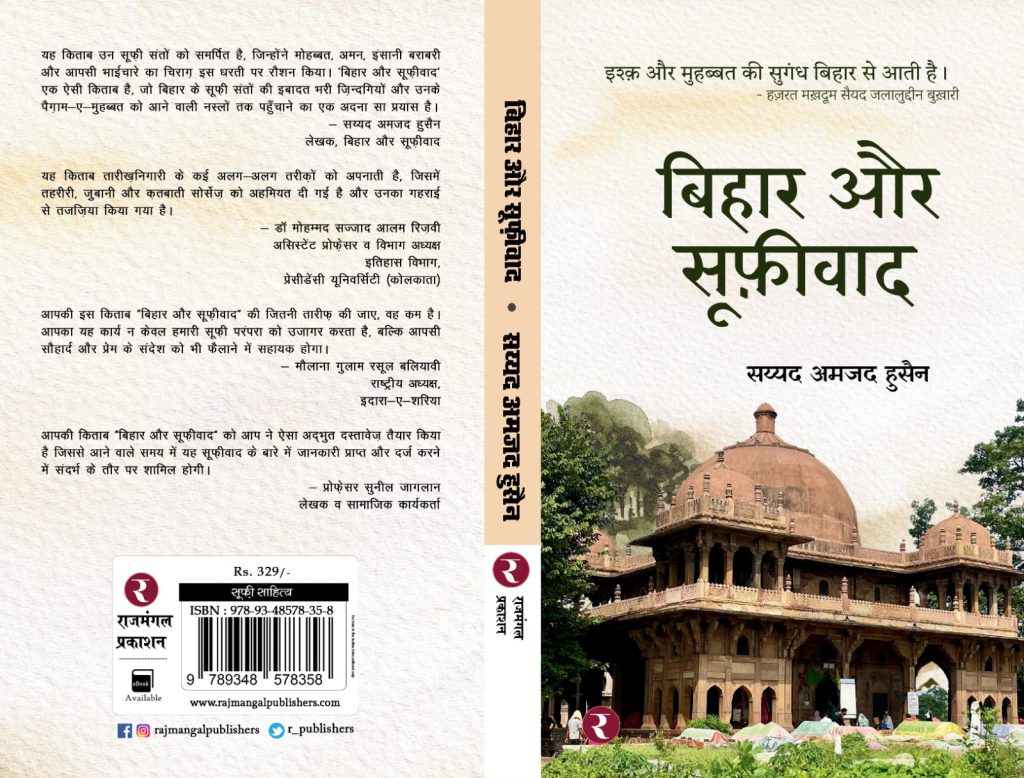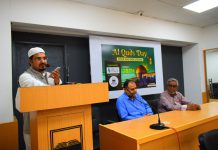Reviewed by Ashwin Afraad
The author of book “Bihar aur Sufivad“, Syed Amjad Hussain presents an extraordinary and much-needed contribution to the documentation of India’s spiritual heritage, particularly the often-overlooked Sufi legacy of Bihar. This meticulously researched volume serves as both a historical archive and a spiritual guidebook, offering a comprehensive insight into the mystical traditions that have shaped Bihar’s religious and cultural landscape.

The book is encyclopaedic in scope and ambition. Hussain delves deeply into the lives, teachings, and spiritual contributions of Bihar’s revered Sufi saints. Drawing from ancient manuscripts, oral histories, authentic records, and first-hand research, he brings to life the world of khanqahs, dargahs, and silsilahs (spiritual lineages) that continue to radiate influence across centuries. This is not merely a spiritual history but a vivid portrayal of how Sufi principles of love, peace, and brotherhood played—and continue to play—a transformative role in society.
One of the most commendable aspects of the book is its thematic coherence. Chapters such as “Sufivad Kya Hai?” (What is Sufism) and “Bihar Mein Sufivad Ka Aagman” (The arrival of Sufism in Bihar) offer a lucid understanding of both foundational Sufi concepts and their regional expressions. The author’s treatment of historical figures such as Hazrat Sharfuddin Ahmad Yahya Maneri, Hazrat Makhdum Sheikh Zakiuddin, and Hazrat Syed Ahmad Jajneri is respectful, insightful, and thoroughly researched. These saints, Hussain reminds us, were not just mystics but reformers whose messages of unity and ethical living remain deeply relevant.

Particularly impactful is the chapter “Aazadi Aur Vibhajan” (Independence and Partition), in which Hussain explores the involvement of spiritual figures in India’s movement for independence and their views against the Partition of India.. Saints such as Hazrat Ahmadullah Shah and Hazrat Majnu Shah Madari are not only memorialised for their piety but honoured for their activism and sacrifice, while Hazrat Hashmat Ali Quadri Lakhnavi and Hazrat Syed Muhammad Miyan played a key role against partition. This intersection of spirituality and socio-political engagement is where the book transcends mere biography and enters the realm of national memory.
Stylistically, the book is marked by clarity, depth, and reverence. Hussain writes with the heart of a devotee and the mind of a scholar. His passion for preserving Bihar’s Sufi heritage is evident in every chapter. The book is richly footnoted, well-organised, and backed by credible sources, making it not just a literary achievement but an essential academic resource.
Bihar aur Sufivad is an invaluable contribution to South Asian studies, Islamic heritage, and the broader discourse on Sufism. It is especially beneficial for readers interested in spiritual traditions, cultural history, and interfaith harmony. Hussain’s work ensures that the legacy of Bihar’s Sufi saints is not only remembered but rightfully elevated.
Reading this book, one is reminded of a profound couplet by Maulana Jalaluddin Rumi: “Ilm ra bar tan zani, maari buvadIlm ra bar del zani, yaari buvad” (If knowledge strikes the body, it becomes a snake. If it strikes the heart, it becomes a friend.)
This book is indeed a friend to the heart, an intellectual and spiritual companion for those seeking meaning beyond the material.
Ashwin Afraad is an Indian poet, writer, storyteller and actor.

















